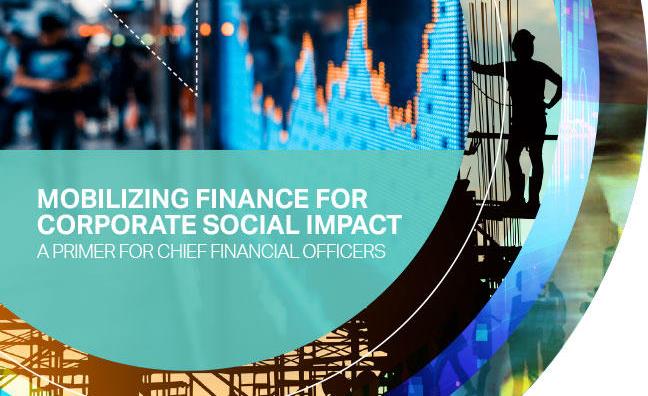


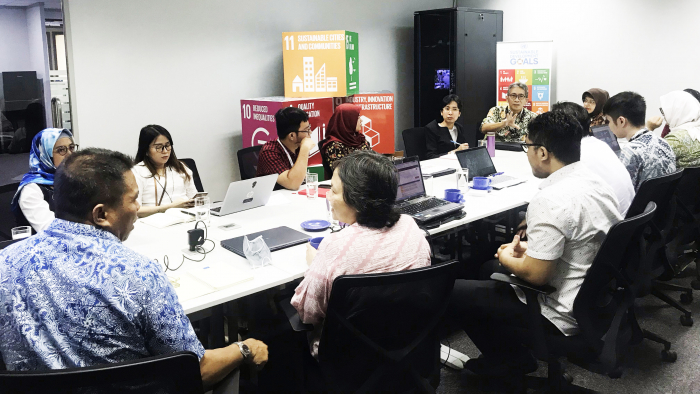
The Global Reporting Standards (GRI) and the Indonesia Business Council for Sustainable Business (IBCSD) collaborated on conducting a Focus Group Discussion regarding the “Alignment of POJK 51/2017 with GRI Standard and SDGs Reporting”.
Although SDGs attainment may not be the primary objective of the Private Sector, the awareness on the importance of SDGs implementation is already high. “Whenever there is a planning of a new project, the consideration on which one or more of the 17 SDGs would be impacted is always on the mind of the decision makers.” stated Ms. Sinta from Unilever.
Hectic discussion between the Private Sector (PT Pertamina, PT Vale, PT APP, PT Unilever & PT Medco Energi), NGOs (GRI, JICA) and the Government (BAPPENAS- SDGs Secretariat) resulted in some valuable insights into current reporting criteria and possibilities for further improvement.
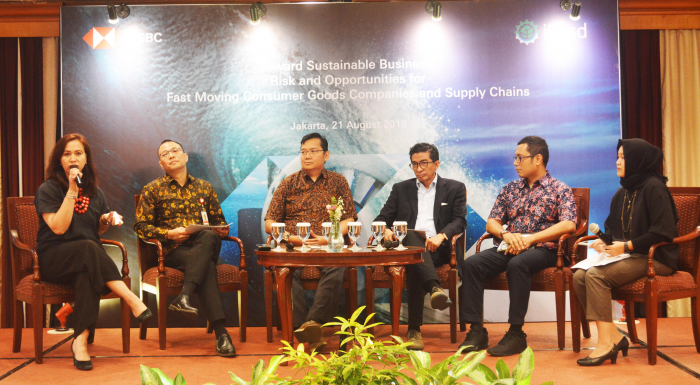
The seminar was attended by around 48 participants from FMCG companies and its supply chains, associations and civil society organization partners. The resource persons from various stakeholders were invited to provide multi-dimension views and trigger further discussion on the seminar topic. They were Mr. Radison Silalahi (Head of Green Industry Standard and Institutional Division, Centre for Green Industry, Ministry of Industry); Mr. Wisman Djaja (Director of Sustainable Agriculture Development, PT Nestlé Indonesia); Ms. Nuni Setyoko (Head of Corporate Sustainability, HSBC Indonesia) and Mr. Robin Tanzil (Senior Vice President Business Banking, HSBC Indonesia); Mr. Glenn Pardede (Managing Director, PT East West Seed Indonesia) and Mr. Aditya Bayunanda (Director of Policy, Sustainability & Transformation, WWF Indonesia).
In his opening remarks, Mr. Anurag Saigal, Deputy Head of Commercial Banking HSBC emphasized that environment is changing and it affects everybody’s life. HSBC has been participated to push forward the agenda of sustainability. Mr. Radison Silalahi from Ministry of Industry in his keynote speech said, “Green industry has been part of market demand and competitive advantage factor in line with increasing awareness of consumers on environmental sustainability. Innovations for green industry will make the companies have more competitive advantage in the future”. Mr. Wisman Djaja from PT Nestlé Indonesia emphasized that sustainability approach will double productivity in agriculture. However, he further underlined the importance of financial access for individual farmer. “Training only to farmers will not bring impact if individual farmer does not have access to financial support because current scheme of credit to farmers, such as KUR has not reached individual farmer”. Mr. Glenn Pardede from PT East West Seed Indonesia shared that his company works to offer high quality seeds. The company involves 7.000 farmers to produce high quality seeds. And the seeds from the factory are distributed to 7 million farmers across Indonesia. Mr. Aditya Bayunanda from WWF Indonesia shared on the importance of traceability of the farmer products. WWF is developing online platform for traceability on palm oil. When this platform is ready, it can also be used for other commodities and can support sustainable sourcing.
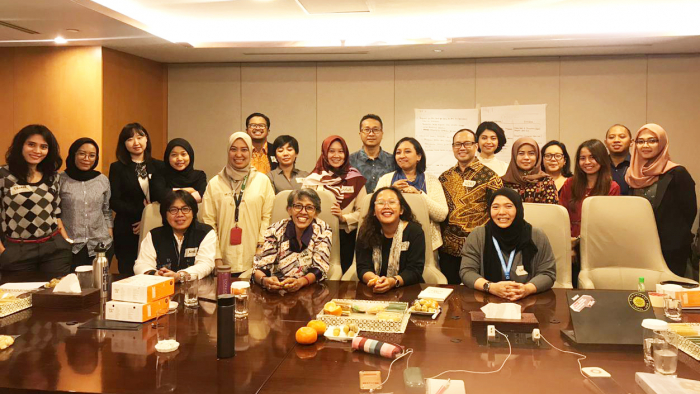
“Children are integral to every buisness – as consumers, as family member of employees and future stakeholder” with this statement, Ms. Lukita, a Child Rights and Business (CRB) Focal point, UNICEF Indonesia started the second training session with specific focus on: “How to use child safegurading tool for private sector”. The training session was highly substantive with materials covering the basic framework of the Child Safeguarding tool and exercises for practical implications in different business sectors.
Participants from 11 IBCSD Member companies, the Conflict Resolution Unit (CRU) and IBCSD brought diverse implications of Child Rights on to the interactive discussion and exercises. Such active participation enabled the session to bear clear understanding on CRBP as well as how in future, businesses could implementthe CRBP, in particular how to use child safe guarding tool for private sector
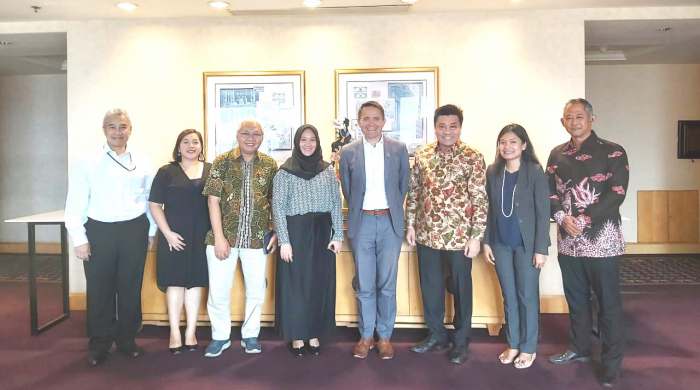
The Tropical Forest Alliance 2020 (TFA 2020) itself is a global public-private partnership in which partners take voluntary actions, individually and in combination, to reduce the tropical deforestation associated with the sourcing of commodities such as palm oil, soy, beef, and paper and pulp. Doing so significantly reduces global greenhouse gas emissions, improves the livelihoods of millions of smallholder farmers, conserves natural habitats, and protects tropical landscapes for future generations. It is a key aspect of delivering sustainable and inclusive rural economic development in tropical forest countries.
TFA 2020 is in a unique position to foster cross-sector collaboration based on a common and ever-deepening understanding of the barriers and opportunities linked to deforestation-free supply chains. Its greatest offering is a partnership of champions for deforestation-free global and local economies, making the case for sustainable supply chains as an essential pathway towards a better economy and achievement of the Global Goals.
read more: https://www.ibcsd.or.id/
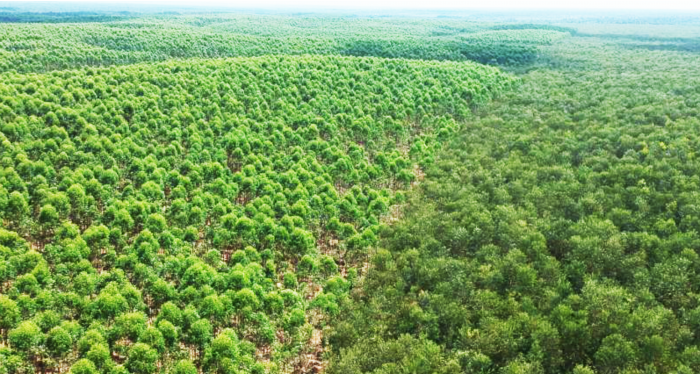
SPOTT aims to facilitate corporate engagement and increase industry transparency. ZSL has developed the SPOTT indicators in collaboration with technical advisors, reflecting and adopting the frameworks of related initiatives, including the Forest Stewardship Council, Carbon Disclosure Project, Accountability Framework Initiative, Global Reporting Initiative, the United Nations Global Compact and the UN Sustainable Development Goals.
According to ZSL, just 20 of the 97 companies that were assessed have committed to zero-deforestation. APRIL’s commitment to ‘eliminating deforestation from our supply chain and to protecting the forest and peatland landscapes in which we operate’ is enshrined in the company’s Sustainable Forest Management Policy (SFMP) 2.0.
APRIL scored above 70% in four indicator categories, namely: landbank, mills and traceability (78.9%); water, chemical and waste management (70.8%); community, land and labour rights (77.3%); and governance and grievances (75%).
Lucita Jasmin, Director of Sustainability and External Affairs, said: “Third party assessments such as SPOTT play an essential role in driving standards of transparency across the industry. The results of this assessment help identify not only areas where we can improve our disclosures but also areas where we can strengthen our policy against SPOTT and the related frameworks. It demonstrates how constructive engagement with civil society groups such as ZSL can help drive continuous improvement in APRIL.”
Other highlights from the 2019 assessment:
For more information, the summary of SPOTT timber and pulp assessments can be found at https://www.spott.org/wp-
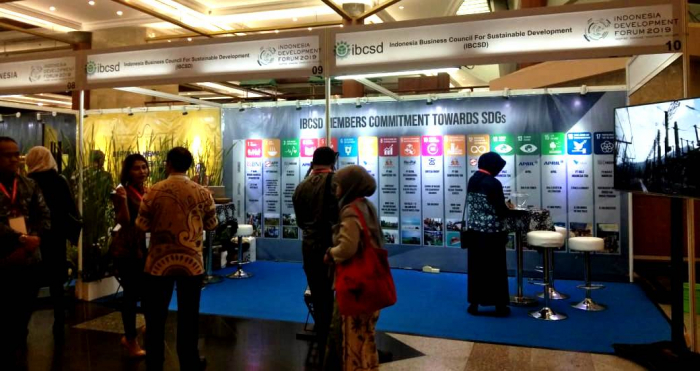
According to the IDF Committee, there were 2950 participants, 100 speakers at ideas and innovations marketplace sessions, 107 speakers at parallel sessions and 37 speakers at plenary sessions in the IDF 2019.
To showcase the IBCSD members commitment and actions on SDGs in Indonesia, the IBCSD set up booth during the IDF with title “IBCSD MEMBERS COMMITMENT TOWARDS SDGs”. Eight companies supported this booth and shared their programs and beneficiaries relating their concrete actions on the SDGs in Indonesia. These companies are BNI, APP Sinar Mas, PT Nestle Indonesia, APRIL, PT Vale Indonesia Tbk, PT HM Sampoerna Tbk, PT Repal Internasional Indonesia and Sintesa Group.
“It is great that the companies already take concrete actions and map their actions in relation to each goal of the SDGs in Indonesia. The government at both national and regional levels also needs to map their actions towards the achievement of each goal of the SDGs” said a visitor from BAPPENAS. Many participants from different institutions visited the IBCSD booth, including the Indonesian Vice President Jusuf Kalla that came for delivering IDF opening remarks. A number of visitors showed their interest to have further discussion with IBCSD and to explore opportunities for potential future collaboration.
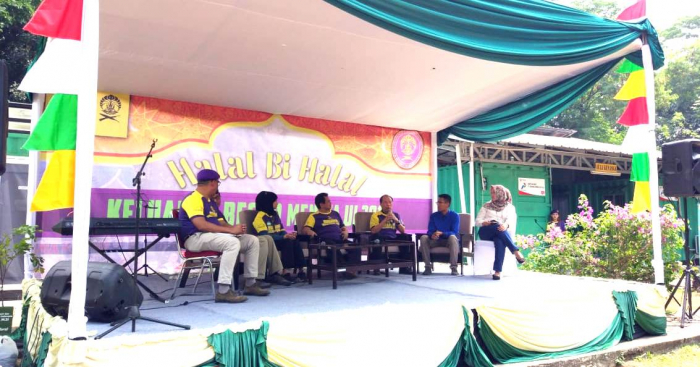
On the panel discussion with the topic of “Role of Technology and Science in Plastic Waste Reduction Program”, the Executive Director of IBCSD, Indah Budiani, gave a talk on Sustainable Consumption and Production (SCP) and Circular Economy. She explained that some industry use plastic waste as a material to run their business or to produce new products. Plastic shouldn’t be blamed, but behavior should. Right behavior and education will prevent plastic in polluting the environment nor as marine debris. This is the role of IBCSD in building partnerships with the government and also members to promote SCP and Circular Economy. IBCSD also encourages members to be responsible for any waste produced from business activities including plastic waste.
Also present on the event was Mr. Agus H. Reksoprodjo who served as Treasurer of the IBCSD and also as the Chair of the Menwa UI’s Alumni Association. Some visitors also enlivened the IBCSD booth.
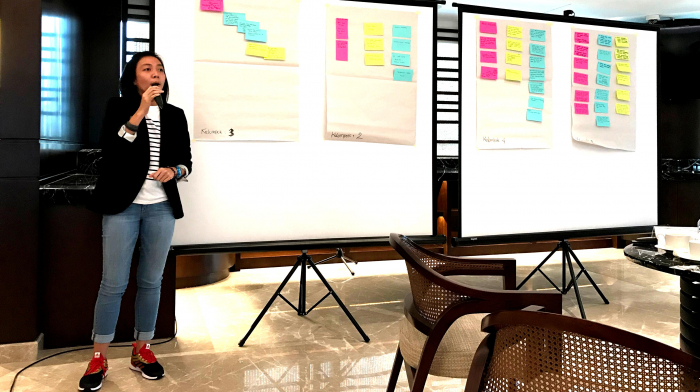
Thirty two people representing 16 different institutions: government institutions, private sectors, associations, banking, non-government organisations participated in the brainstorming. The brainstorming session focused on the current problems, strengths and opportunities for the investment of private sectors for inclusive food systems in Indonesia. Just to mention few burning issues among other else are concerning the ageing farmers and the conversion of agricultural land. On the former, based on the data of Central Statistics Agency (BPS) in 2018 the average of farmers’ age above 45 years old reaches 64,2%. And on the latter, a serious challenge is the fact that the availability of agricultural land for the last five years has been decreasing.
Director for Food and Agriculture, Ministry of National Development Planning (BAPPENAS), Mr. Anang Noegroho in his presentation said that food sector is one of the focused priorities in the coming National Medium-Term Development Plan 2020-2024. The government will increase food availability, access and safety, including by improving the governance of national food systems. Mobilization of participation and investment of private sectors is very crucial to support the achievement of inclusive food systems in Indonesia.